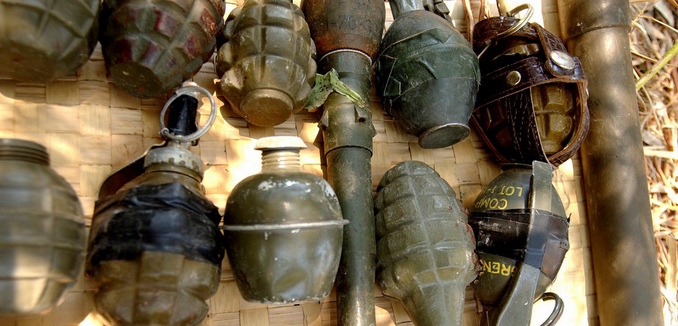Six residents of the village of Ghajar on the Golan Heights were accused on Thursday of planning a terror attack in Israel with help from the Iran-backed terror group Hezbollah.
Diab Kahamuz, the alleged ringleader, was caught after he apparently forgot where he hid the explosives he received from Hezbollah. The explosives were found by an Israeli farmer, who called the police on July 30. An investigation led to the arrests of Kahamuz, his brothers Yussuf and Jamil, a cousin, and two other Ghajar residents in September, though the case remained under a gag order until indictments were filed.
Diab Kahamuz was charged with aiding the enemy in wartime, espionage, contact with a foreign agent, giving information to the enemy, conspiring to aid the enemy in wartime, weapons offenses, attempt to import weapons, and conspiring to commit a crime.
The plot emerged from communications Kahamuz allegedly received via encrypted emails from his father Saeb, a drug smuggler who fled to Lebanon ten years ago and instructed his son to use his smuggling routes to import explosives to carry out a terror attack in the Haifa area. Diab retrieved a cache of explosives that was thrown over the border fence in May. He hid the explosives in a grove near the northern Israeli city of Metulla. Explosives experts who examined the devices determined that they were powerful and had been constructed by Hezbollah.
Saeb Kahamuz instructed his son to scout locations in Haifa to target, but Diab found security in the city to be too tight, with too many cameras, so he adjusted his search for possible attack locations. “While he was driving through the Tur’an Junction, the defendant noticed a bus stop filled with many soldiers,” his indictment alleged. Diab thought this was a suitable target “as it would allow harming many soldiers—and took photos of the place with his Samsung (cellphone).” Jamil then sent photographs of the location to his Hezbollah handlers.
Authorities said after the arrest that the suspects’ computers and phones contained photographs of potential targets, including military bases.
“Hezbollah and other terror organizations are making great efforts to carry out attacks inside the State of Israel, while working to recruit collaborators from among the citizens of the state,” the police said in a statement. “A quick and thorough investigation into several lines of inquiry has led to the arrest of all of the members of the terror cell and prevented a mass-casualty terror bombing.”
The Hezbollah-linked terror plot is only the latest example of Iran-sponsored aggression in Israel’s north. Iranian state media reported last month that Hezbollah is preparing to move troops into the southern Golan area, bordering Israel. Hezbollah and Syrian Army soldiers are reportedly preparing to launch operations against rebel groups operating near Israel’s border. In response to these reports, the IDF said that it “closely monitors all of Israel’s borders, including in the north, and remains prepared for any scenario.”
Hezbollah chief Hassan Nasrallah boasted in June that all of “its weapons and rockets are from the Islamic Republic of Iran.” Nasrallah’s speech seems to confirm an assurance given to him last August by Iranian Foreign Minister Mohammad Javad Zarif that the nuclear deal presented “a historic opportunity” to confront Israel. Iran recently announced that its military spending would increase by 90% in the coming year. UN Security Council Resolution 1701 forbids the arming of Hezbollah, but Iran has continued to send the terrorist group weapons and the Security Council has refused to enforce it.
In August, former Shin Bet chief and current chairman of the Knesset’s Foreign Affairs and Defense Committee Avi Dichter warned the improved capabilities that Hezbollah developed while fighting in the Syrian Civil War will make any future war between Hezbollah and Israel much bloodier. This assessment was echoed by Nadav Pollak of the Washington Institute for Near East Policy, who asserted then that Hezbollah’s position within the so-called “resistance axis” of Israel’s enemies “has been strengthened” due to its participation in Syria’s civil war
According to a July report published by the Foundation for Defense of Democracies (FDD), Israeli officials believe that any future war with Hezbollah has the potential to cause “thousands of civilian deaths” in Israel. In February, Hezbollah threatened to attack ammonium tanks in Haifa, which could kill tens of thousands of people.
[Photo: Israel Defense Forces / Flickr ]




